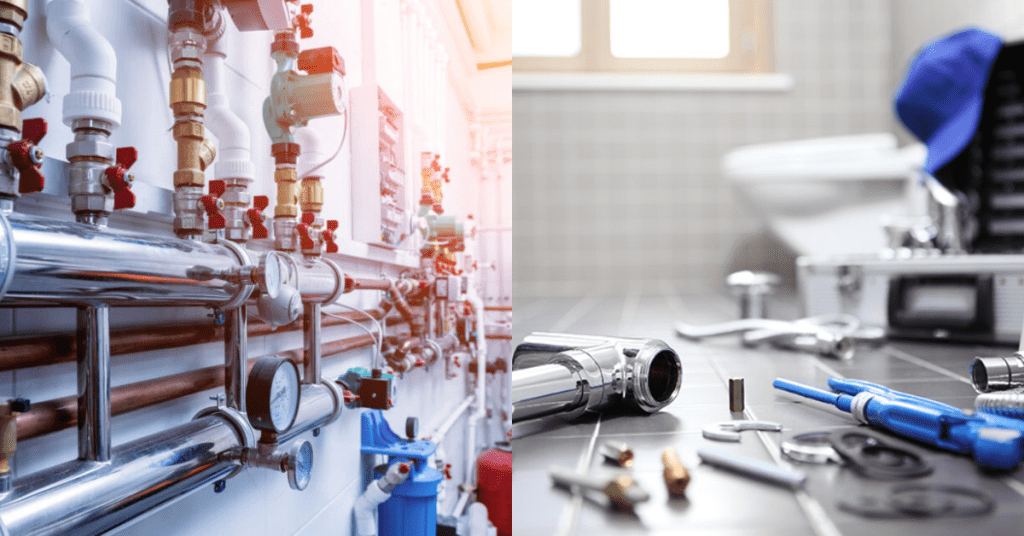Commercial Plumbing Services: 6 Main Differences Between Commercial and Residential

Residential plumbing services and commercial plumbing services are the two separate plumbing services that plumbers provide. Residential plumbing services are crucial for residential areas since, without them, the plumbing in our houses cannot operate effectively. Commercial plumbing services, on the other hand, are crucial for companies and industries. Although it’s simple to assume that the two are equivalent, most plumbing firms seldom have both of these specialisations. Let’s now discuss the key differences between plumbing in a home setting and plumbing in a commercial one.
The Primary Differences
Let’s begin by outlining the extent of commercial plumbing compared to some other alternatives available. A specialist specialising in plumbing fittings in various commercial business settings is a commercial plumber. This might include:
- Simple office structures
- Large commercial complexes, such as shopping malls
- Any buildings or constructions having outlets and pipelines of an industrial standard
- Large buildings with several storeys
- Recreational facilities, such as park restrooms
Any non-residential structure with numerous visitors likely falls within the purview of a commercial plumber. The chores aren’t all that dissimilar from those of a domestic plumber. Commercial plumbing services are still in charge of:
- Repairing a pipe or fixture because of damage or ordinary wear and tear
- Checking plumbing components such as modules for water pressure sensors, water heaters, and others to ensure they are in good working order
- Performing regular preventive maintenance and inspections
- Talking to property owners to provide advice and warnings on possible problems
- Cutting and putting together different plumbing pipes and fixtures
6 Key Distinctions Between Commercial and Residential Plumbing
Commercial plumbing concerns differ from home plumbing problems in many ways:
Size
Home plumbers don’t enter the commercial plumbing industry because this is most likely the single biggest distinction between residential and commercial plumbing. Even with smaller structures, plumbing systems are often bigger and more complicated than in a typical home. The volume of consumption is another point that has to be made.
Compared to residential plumbing, which only includes a single home, commercial plumbing may have a large number of people using the plumbing, such as water fountains, sinks, or toilets regularly. In addition to increasing the plumbing system’s wear and tear, this also increases the possibility of catastrophic events.
Overall, commercial works will take longer to complete, and property owners will likely adopt preventative measures rather than reactive ones to lower the probability of a significant plumbing problem.
Multiple Narratives
This merits a separate mention because of the different ways it affects commercial plumbing work. Most home plumbing projects include one level, if not two. But there can be numerous storeys if we’re talking about a big office building. Plumbers should remember that each group of business buildings has unique fixtures that need repair during regular maintenance and service inspections. The influence of gravity on your work performance is another factor. In multi-story structures, poor water pressure has a more noticeable impact because it prevents pipes from functioning as they should.
Local Laws
To operate on properties, both residential and commercial plumbers must have a valid state licence. However, there may be differences in the state plumbing regulations for residential and commercial structures. Consequently, you should ensure that any plumbing work you do complies with business requirements. If something isn’t done correctly, the property owner might face hefty penalties in addition to paying for further repairs.
Inspection Intervals
Overall, more frequent and comprehensive inspections are required in residential settings. Commercial plumbers must allocate increasing percentages of their budget to items like pipe cameras to meet these plumbing demands.
Industry Expertise
Commercial projects may involve industrial-grade pipes and fittings. Thus, a licenced plumber experienced in handling these requirements should be employed. This, along with size and scope, is the second leading factor preventing home plumbers from entering into commercial contracts to increase their clientele. Business plumbers may focus their expertise on a certain kind of business facility to get acquainted with the fixtures often used for installation, repair, and general maintenance.
Working Hours
Timing is the last significant element that is seldom discussed. Residential plumbers usually have time to work. That’s harder for business areas frequented by hundreds of people daily. Commercial plumbers must be flexible, shutting down the plumbing system on weekends or off-hours. Commercial plumbers may need to build temporary plumbing facilities if the project takes many days.
In Summary
Hiring a professional commercial plumbing service is essential for any task, issue, or project to ensure your business plumbing system is in excellent hands. Strata Plumbing Services in Perth is delighted to assist when you have minor problems like clogged toilets, sinks, or bathtubs or more major ones like broken or leaking pipes. If you want to renovate your home or business property, you should first speak with a commercial plumbing services expert to see if your plumbing system will be impacted.








